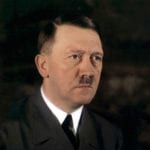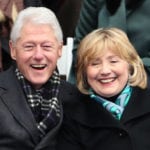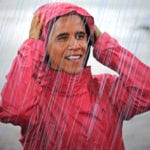 Weird Stuff
Weird Stuff  Weird Stuff
Weird Stuff  Health
Health Ten Confounding New Inventions from the World of Biomedicine
 Creepy
Creepy 10 Death Superstitions That Will Give You the Creeps
 Movies and TV
Movies and TV 10 Movies That Get Elite Jobs Right, According to Experts
 Weird Stuff
Weird Stuff 10 Times Real Laws Were Based on Bizarre Hypotheticals
 Animals
Animals 10 Inspiring Tales of Horses Being Human
 Mysteries
Mysteries Top 10 Haunting Facts About the Ghost Ship MV Alta
 History
History 10 Surprising Stories About the Texas Rangers
 Humans
Humans 10 Philosophers Who Were Driven Mad by Their Own Theories
 Miscellaneous
Miscellaneous 10 Video-Game-Worthy Weapons and Armors from History
 Weird Stuff
Weird Stuff 10 Warning Labels That Exist Because Someone Actually Tried It
 Health
Health Ten Confounding New Inventions from the World of Biomedicine
 Creepy
Creepy 10 Death Superstitions That Will Give You the Creeps
Who's Behind Listverse?

Jamie Frater
Head Editor
Jamie founded Listverse due to an insatiable desire to share fascinating, obscure, and bizarre facts. He has been a guest speaker on numerous national radio and television stations and is a five time published author.
More About Us Movies and TV
Movies and TV 10 Movies That Get Elite Jobs Right, According to Experts
 Weird Stuff
Weird Stuff 10 Times Real Laws Were Based on Bizarre Hypotheticals
 Animals
Animals 10 Inspiring Tales of Horses Being Human
 Mysteries
Mysteries Top 10 Haunting Facts About the Ghost Ship MV Alta
 History
History 10 Surprising Stories About the Texas Rangers
 Humans
Humans 10 Philosophers Who Were Driven Mad by Their Own Theories
 Miscellaneous
Miscellaneous 10 Video-Game-Worthy Weapons and Armors from History
Top 10 Costly US Presidential Campaign Blunders
Presidential candidates have done a lot of stupid things. Back in 1988, then-contender and current Democratic Party front-runner Joe Biden plagiarized someone else’s stump speech nearly verbatim, leading directly to his demise.
In 1992, George H.W. Bush checked his watch during a nationally televised debate as if he had somewhere more pressing to be. And after winning a key early primary in 2004, Howard Dean did his best (and worst) Tarzan impression.
Those were bad. These are worse. Here are 10 crucial, cringeworthy campaign blunders.
10 Worst Dirty Tricks In American Politics
10 Hoover Kills War Vets—And His Reelection Chances
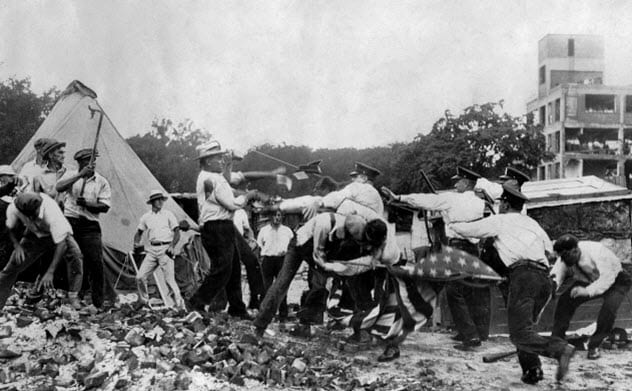
Republican Herbert Hoover may be America’s unluckiest president. The stock market crash of October 1929 happened less than a year into his administration, ushering in the Great Depression.
Millions lost their jobs, and in a time before social safety nets like unemployment benefits, many found themselves homeless. Shantytowns sprung up nationwide bearing a mocking eponym: Hoovervilles.
People were broke, and Hoover was portrayed as an impotent, do-nothing president espousing the virtues of self-reliance while the country spiraled. Worse, his Democratic opponent in 1932, New York governor Franklin D. Roosevelt, was promising a “New Deal” whereby legions of unemployed would be hired to build public projects like roads, bridges, and other infrastructure.
Hoover needed to do, well, something. So he killed World War I veterans for demanding their hard-earned combat compensation.
In July 1932, 17,000 US war veterans, many jobless since the Depression’s onset, gathered in Washington, DC, to demand early payment on bonuses that weren’t officially due until 1948. The group became known as the Bonus Army, and most found their request reasonable considering the calamitous economic circumstances.
Hoover’s response? He had the military fire on them, killing two. Hundreds more were wounded in the ensuing melee as the active army burned the Bonus Army’s encampment to the ground.[1]
Hoover lost in a landslide. Apparently, killing soldiers within shouting distance of the White House is an election year “don’t.”
9 Nixon Goes a’ Travelin’
Richard Nixon’s disastrous 1960 debate against John F. Kennedy is widely known political infamy. The photogenic JFK appeared composed, confident, and cordial, while the typically forceful Nixon seemed sallow, aloof, and physically drained. The result was a nationally broadcast blowout, with the overwhelming majority of the incredible 74 million viewers giving the edge to JFK. He went on to narrowly win the election.
However, few know the genesis of Nixon’s game-changing debate dud: an uncharacteristically dumb pledge to visit all 50 states during his campaign.[2]
The US presidency, of course, is determined by winning a critical number of states rather than the popular vote. Many states are safely in the pocket of one candidate or the other. Today, for example, Texas is reliably Republican and California is Democratic.
By visiting every US state—even the far-flung Alaska and Hawaii—Nixon wore himself out vying for dubiously important votes before bombing in the campaign’s most crucial event: a debate watched by tens of millions coast-to-coast.
Despite advisers’ pleas to break his pledge, the stubborn Nixon stayed the long, country-crossing course even after being hospitalized for two weeks. Not so tricky, Dick.
8 Hubert Humphrey’s Hubris
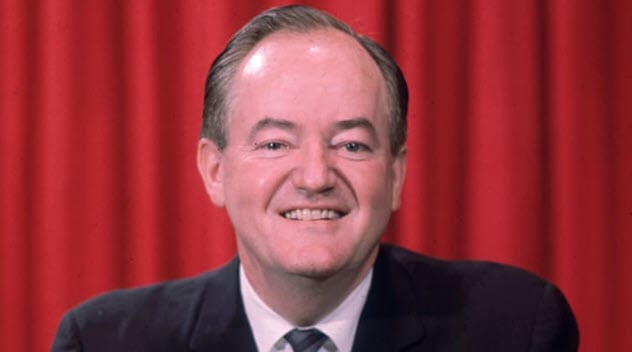
1968 was a wild year. In March, President Lyndon Johnson announced that he would not seek reelection. Days later, Martin Luther King Jr. was assassinated. In June, New York Senator and presidential hopeful Robert Kennedy also was murdered.
The Democratic National Convention was overshadowed by bloody riots. Vice President Hubert Humphrey emerged as the nominee, setting up a contest against Richard Nixon that fall. The country was deeply divided, and the race was really close.
Then Richard Nixon essentially committed treason.
Just weeks before the election, President Johnson gave his VP a game-changing gift: peace in Vietnam. All bombing halted, and a breakthrough in the peace negotiations was announced. But this time, Tricky Dick lived up to his moniker.[3]
Working through a back channel, he sabotaged the negotiations. Luckily, Johnson had wiretapped proof of Nixon’s malfeasance and immediately told Humphrey, who in turn promptly . . .
. . . did absolutely nothing. Why? Despite polls showing a dead heat, Humphrey inexplicably thought he had a solid lead. So instead of exposing his opponent for prolonging a war for political gain—borderline treason—Humphrey allowed Nixon to become leader of the Free World.
7 1972: Shocking And Appalling
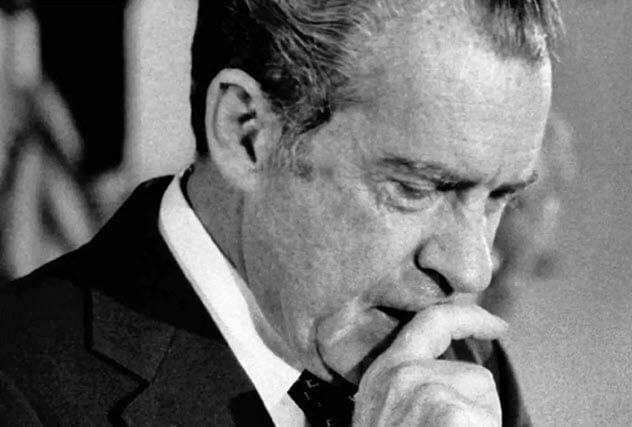
Four years later, Nixon’s reelection was never really in doubt. The Democratic nominee, George McGovern, was seen as far too left-leaning for the wider electorate. His vociferous band of liberal loyalists was perceived as no match for Nixon’s “silent majority.”
For any chance at victory, McGovern needed to do everything perfectly and still get a little lucky. Everything did not go perfectly. In fact, it went shockingly poorly. McGovern chose Thomas Eagleton as his running mate. Two weeks later, Eagleton revealed that he’d undergone electroshock treatment for “nervous exhaustion and fatigue.” Ouch.
Meanwhile, Richard Nixon had already overestimated his opponent and covered up the most unnecessary and costly attempted robbery in US history: Watergate.[4]
A result of appallingly poor judgment, the bungled break-in at Democratic Party headquarters was a needless attempt to gather opposition research in a year when Nixon’s reelection was near certain. The self-inflicted wound led directly to Nixon’s forced resignation two years later.
6 Dukakis Tanks
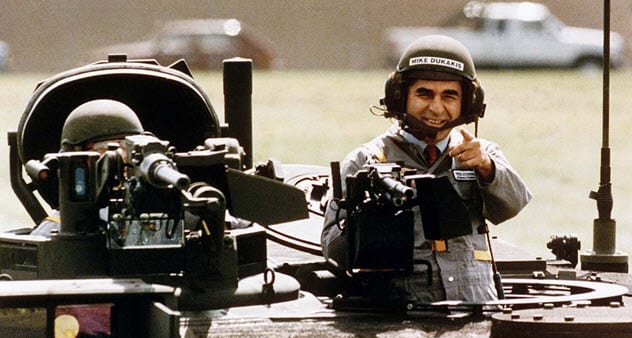
In 1988, Michael Dukakis was riding high. Having been named his party’s presidential nominee at the Democratic National Convention, the Massachusetts governor led Republican Vice President George H.W. Bush by 17 percentage points in July. Considering the lingering effects of 1987’s Iran-Contra scandal, the odds were firmly in Dukakis’s favor heading into autumn’s general election.
But the race tightened. Bush cut into the deficit. He was aided by the racially charged “Weekend Passes” ad that accused Dukakis of granting weekend leaves from prison for murderers. Meanwhile, World War II footage circulated of a stoic Bush climbing aboard a submarine after being shot down as a fearless young fighter pilot. It positioned the VP as a no-nonsense, death-defying patriot.
With his opponent looking like a tough-on-crime war hero, Dukakis yearned to demonstrate his readiness to be commander in chief. So he did something incredibly dumb for a short, bookish man: He rode around in a tank while wearing a helmet. The throng of journalists on hand doubled over in laughter as Dukakis looked more preschooler than presidential. The campaign never recovered.[5]
10 Dirty And Disturbing Political Campaign Ads
5 Gore’s Restricted Recount
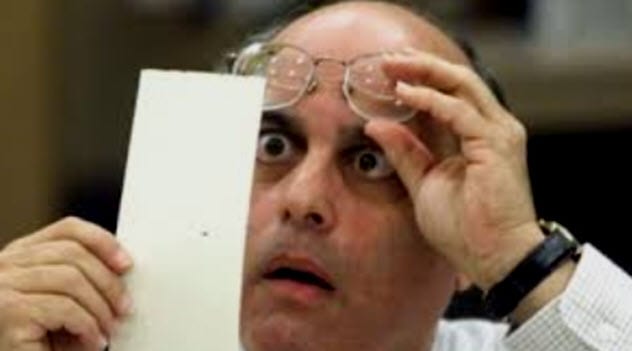
The closest election in US history was the 2000 contest between Texas governor George W. Bush and then–Vice President Al Gore. The election hinged on the famous recount in pivotal Florida, where razor-thin vote margins fluctuated throughout the unprecedented month-long process. A key factor in the outcome was a major Gore miscue.
On election night, Bush led by a nearly impossible 1,784 votes of the almost six million votes cast in Florida. With the margin under 0.5 percent, a machine recount was triggered that narrowed Bush’s lead to an unfathomable 327 votes.
The ensuing drama was cable news gold. Mass demonstrations by both sides. The Republican Florida Secretary of State Katherine Harris impotently declaring Bush the victor. The Brooks Brothers riot. Finally, the Supreme Court ruling that made Bush president-elect.
But the most important event happened before any of this. On November 10, immediately following the machine recount, the Gore campaign requested a full manual recount . . .
. . . of just four, heavily Democratic counties.
Lost in the subsequent litigation was the obviousness that this cherry-picked request would get, well, lost in litigation. Gore’s transparent request to manually recount some-but-not-all ballots gave Bush’s team legal standing that ultimately allowed the Republican-leaning Supreme Court to stop the process dead in its tracks and declare the candidate currently ahead—Bush—the winner . . . by 537 votes.
Only in hindsight was Gore’s fatal decision—not asking for a simple, politically unbiased statewide manual recount—met with significant scrutiny.[6]
4 Kerry’s Judgment Goes AWOL
George W. Bush didn’t need a recount four years later. He only needed Karl Rove, a brilliantly ruthless political strategist whom the nickname-spewing president endearingly called “Turd Blossom.” Bush also needed an overconfident opponent who apparently thought smear campaigns weren’t effective during actual campaigns.
John Kerry was a bona fide war hero. In Vietnam, he led missions in arguably the conflict’s most dangerous theaters: navigating river swift boats. The record shows that Kerry served admirably: He was wounded three times and earned medals.
Deciding the war was unjust, Kerry returned from battle a prominent anti-war activist. He launched a lengthy political career, culminating in the Democratic Party’s 2004 presidential nomination.
Enter the “Swift Boat Veterans for Truth,” who began a modestly budgeted campaign that claimed Kerry had grossly exaggerated his service (even his injuries). Rove quickly fanned the flames with funds and media surrogates.[7]
Kerry did what he most certainly did not do in Vietnam: He froze. Instead of snuffing out an attack with the truth, he let the false narrative fester for months with no real response. It took a Turd Blossom to do something that the Vietcong could not: Sink John Kerry.
3 Romney’s Female Filing System
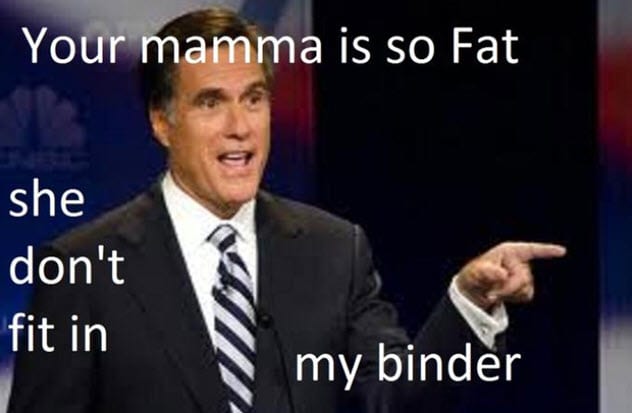
As the 2012 presidential election entered the stretch, polls showed incumbent Democratic president Barack Obama leading his Republican challenger, former Massachusetts governor Mitt Romney. The race was no blowout, but Romney had ground to close.
To everyone’s surprise, Romney did just that—by outdebating one of the most eloquent, composed presidents in US history. And “outdebate” is an understatement. Romney annihilated Obama in what is roundly considered among the most lopsided presidential debates. The upset left the race in a dead heat going into the second debate.
Then Romney said something that drew negative attention to his views on women, his religion, and his billionaire out-of-touchedness . . . all in four short words. Responding to a moderator’s question regarding gender pay equity concerns during his time as governor, Romney insisted he had “binders full of women.”[8]
The weird word choice drew derision and mockery. Who keeps binders anymore, period, let alone gender-specific ones?
Worse still, the notion of keeping a bunch of women tucked away somewhere played into concerns about Romney’s faith because he was the first Mormon nominated by a major party. The remark drew comparisons to the unlawful practice of polygamy once widely practiced by Mormons.
Unfortunately for Romney, his blunder wasn’t placed in a binder. Instead, it went viral, even prompting “yo mama” joke memes. The campaign never fully recovered.
2 Hillary Clinton: Miss Wisconsin
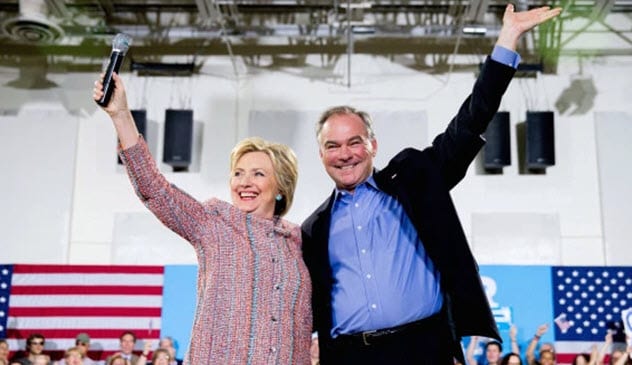
Hillary Clinton’s 2016 presidential campaign was riddled with poor decisions and even worse luck. It took a perfect storm to finish runner-up despite winning nearly three million more votes than Donald Trump, a man who—among other idiosyncrasies—had never held public office.
Emerging from a tougher-than-expected primary challenge for the Democratic Party nomination, Clinton chose a snooze-fest centrist, Tim Kaine, as her running mate. Predictably, he did nothing to help. Her team was hacked by Russia-linked cyber crooks, and she fainted during a service commemorating the September 11 terrorist attacks.
Still, two weeks before Election Day, Clinton had a 14-point lead nationally. But nationally doesn’t matter; the electoral college—a critical accumulation of states—does.
After one last lump of bad luck—the FBI reopening an investigation into Clinton’s inappropriate use of a private email server in late October, a result of Clinton’s chief aide being married to a sex offender—the lead narrowed but still seemed safe.
It wasn’t. Because it’s hard to win close states you completely ignore.
Hillary Clinton lost Michigan, Wisconsin and Pennsylvania—which combined would have flipped the election—by about 77,000 votes. That’s the capacity of a US football stadium. She took reliably Democratic-leaning Pennsylvania for granted until a too-little-too-late rally the night before the election. In Michigan, she ignored pleas to reallocate resources from less valuable states.
But Hillary saved the worst for Wisconsin. Because she simply never went there. At all. Like not once in the agonizingly long US presidential campaign.
Hillary thought the game was over and stopped competing. It cost her the presidency.[9]
1 Wildcard (Because He Won): Abe’s Honestly Awful VP Pick
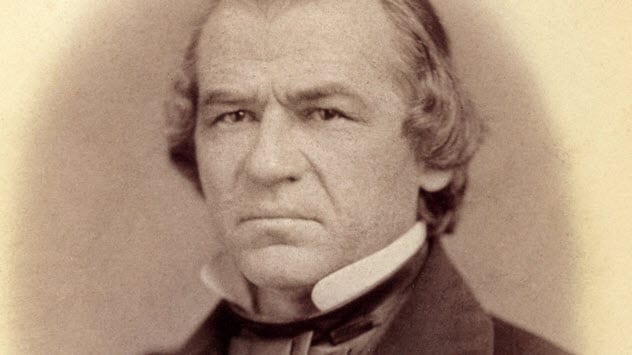
Why is two-time winner Abraham Lincoln on this list? Because his choice for vice president in 1864 was so epically poor that it could have transformed the Civil War’s outcome.
By mid-1864, the war was in its fourth brutal year and a Union victory was far from certain. To help his chances, the Republican Lincoln decided to dump Vice President Hannibal Hamlin. Instead, Lincoln reached across the aisle to tap Democrat Andrew Johnson, a Union loyalist from the then-Confederate state of Tennessee.
Although it wasn’t unheard of in the 1800s for the president and VP to be from different political parties, this was not the time for it. And no time would have been right to choose the crude, virulently racist Johnson.
For starters, the official 1864 platform of Johnson’s Democratic party was peace—even if it meant allowing Southern states to remain slaveholders despite Lincoln’s 1862 Emancipation Proclamation. So, during a bloody, existential war, Lincoln placed a questionably committed man from his rival, negotiation-minded party one heartbeat away from commander in chief.
Lincoln was well aware of his own precarious safety, even having premonitions of his death. What if some Southern sympathizer decided to snuff him out to further the Confederate cause? Johnson’s ascension could be ruinous for the Union.
And it would have been if Lincoln had not lived just long enough: He was assassinated less than one week after the Confederacy surrendered. Johnson’s putrid tenure as president included opposing the 14th Amendment, which granted citizenship to former slaves, severely hampering Southern Reconstruction efforts, and eventually getting impeached.[10]
The finest president in US history gave rise to among its worst through a near-catastrophic campaign decision.
9 Comedians Who Ran For President Of The United States
About The Author: Christopher Dale (@ChrisDaleWriter) frequently writes on politics, society, and sobriety issues. His work has appeared in NY Daily News, Parents.com, Daily Beast, and more.


